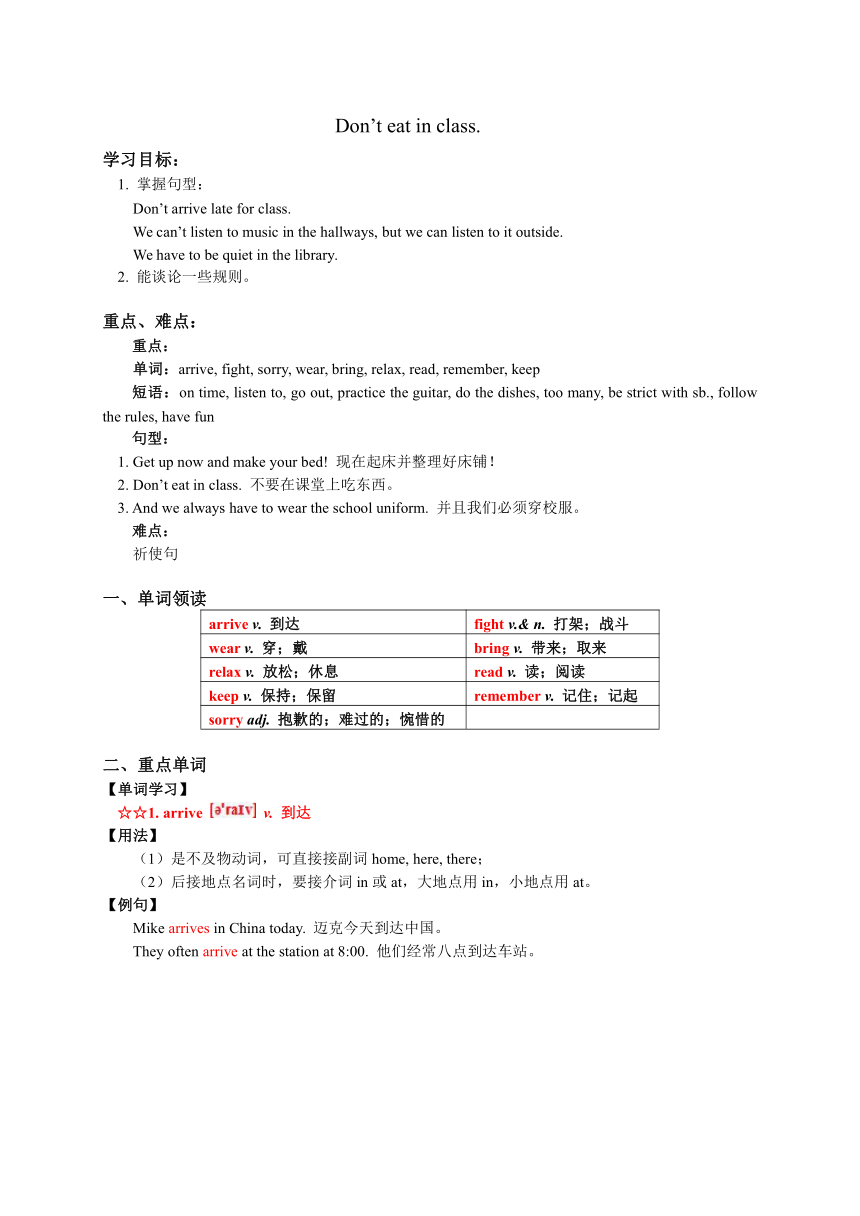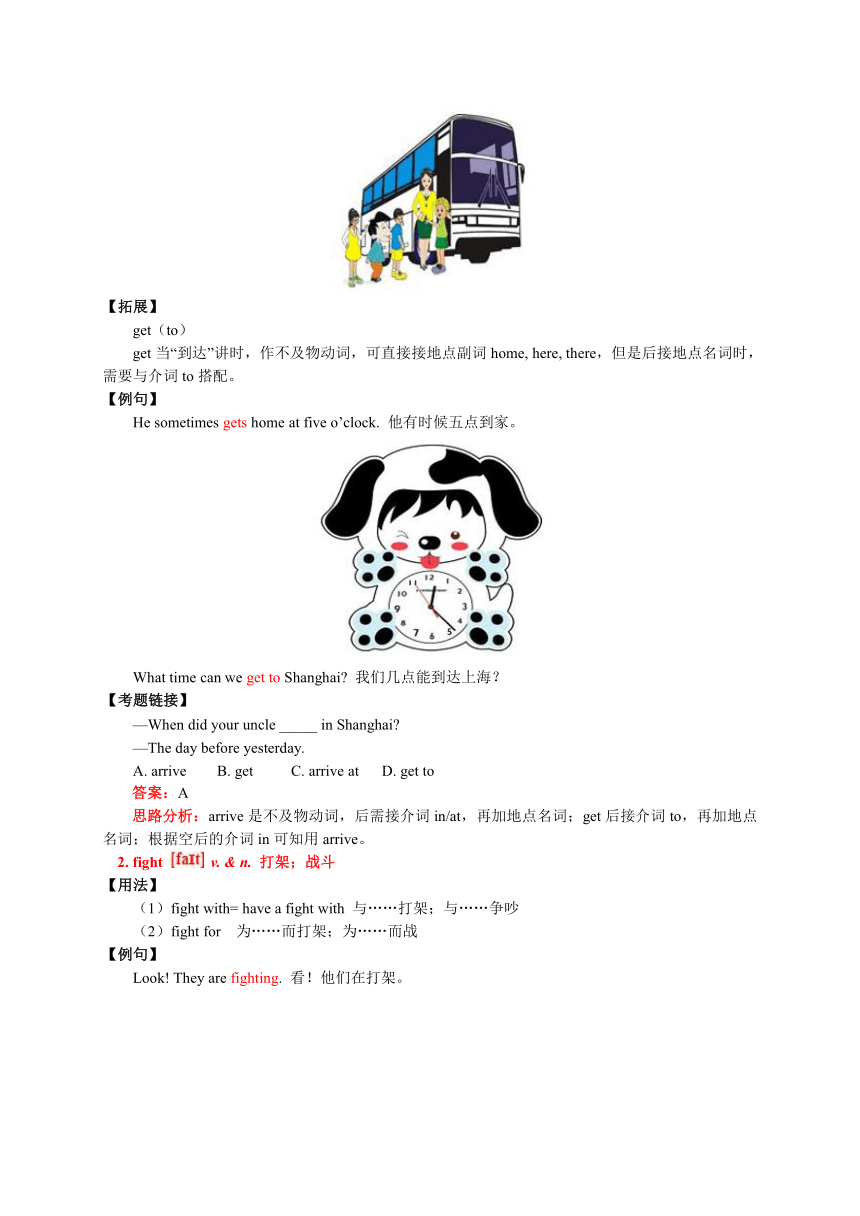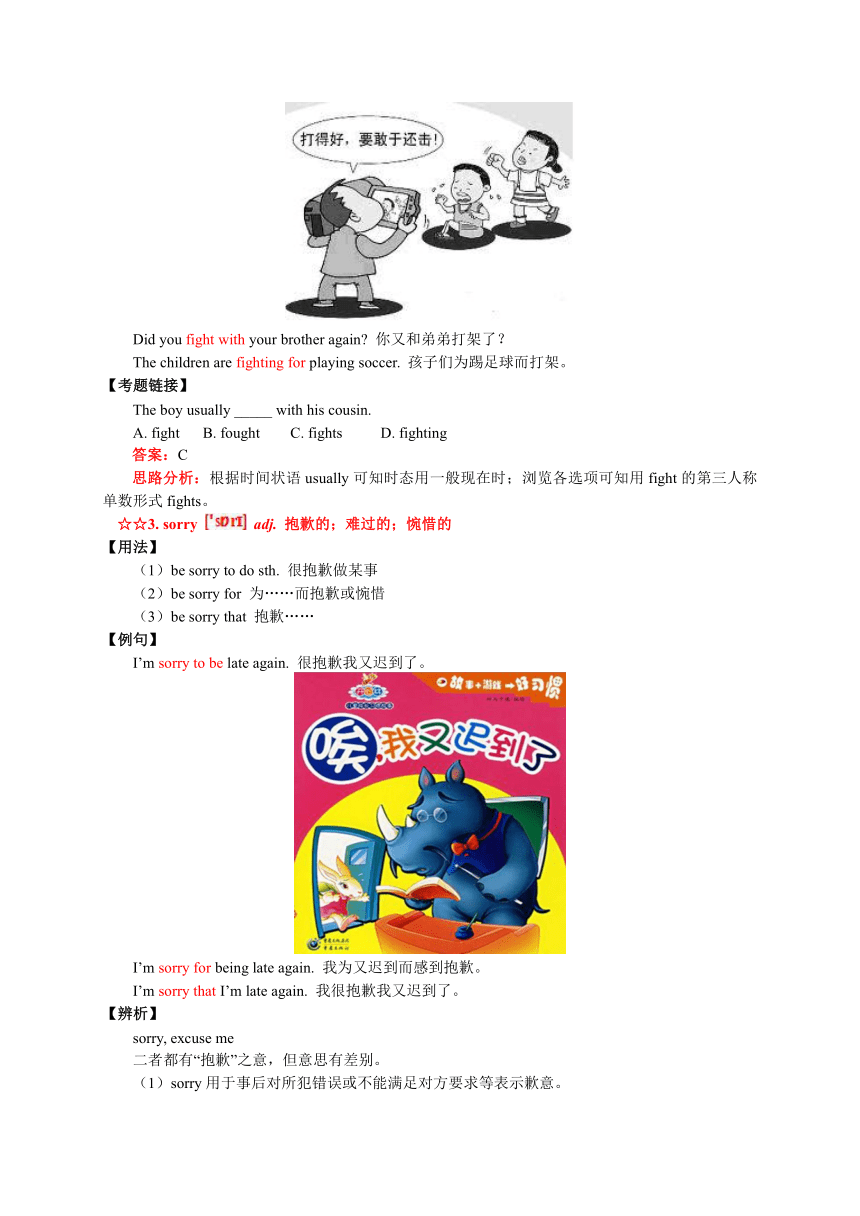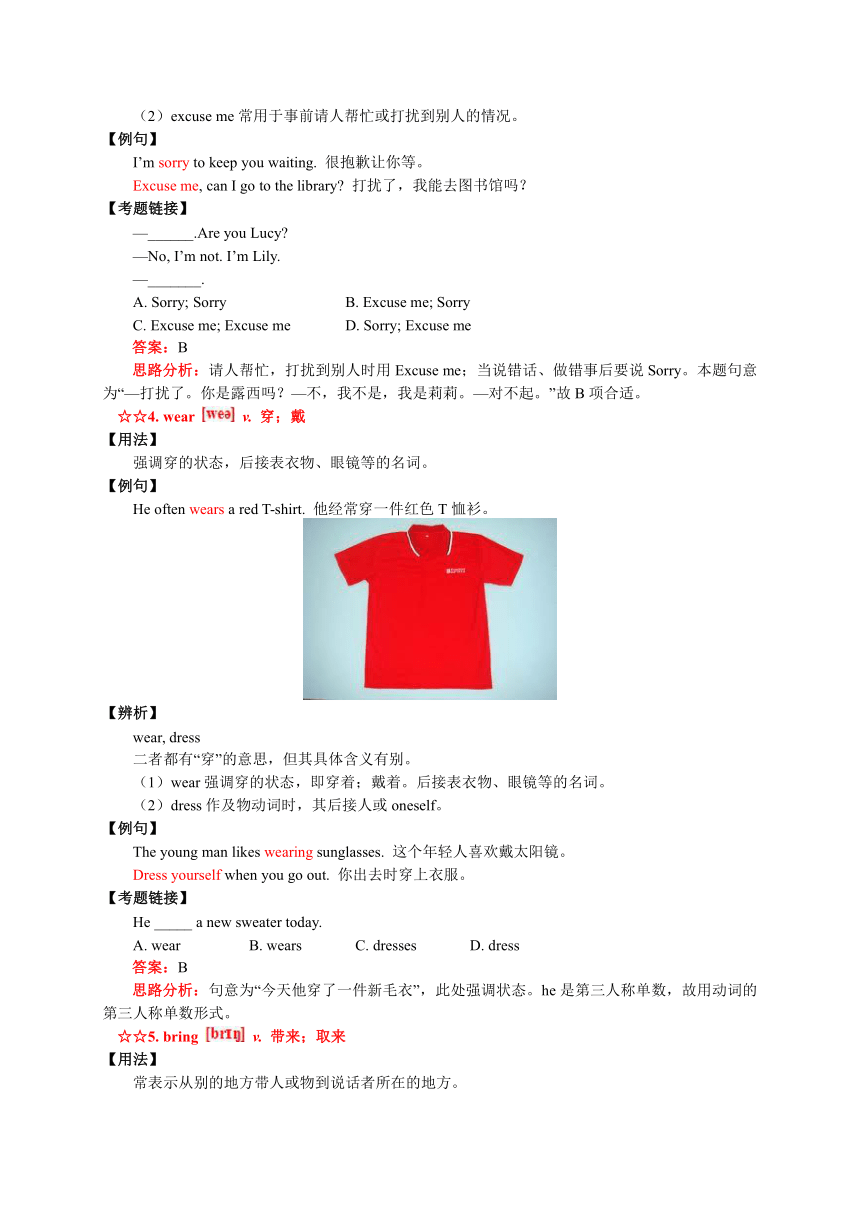Unit 6 Don’t eat in class.学案(含解析)
文档属性
| 名称 | Unit 6 Don’t eat in class.学案(含解析) |

|
|
| 格式 | zip | ||
| 文件大小 | 1.8MB | ||
| 资源类型 | 教案 | ||
| 版本资源 | 鲁教版 | ||
| 科目 | 英语 | ||
| 更新时间 | 2019-04-01 00:00:00 | ||
图片预览





文档简介
Don’t eat in class.
学习目标:
1. 掌握句型:
Don’t arrive late for class.
We can’t listen to music in the hallways, but we can listen to it outside.
We have to be quiet in the library.
2. 能谈论一些规则。
重点、难点:
重点:
单词:arrive, fight, sorry, wear, bring, relax, read, remember, keep
短语:on time, listen to, go out, practice the guitar, do the dishes, too many, be strict with sb., follow the rules, have fun
句型:
1. Get up now and make your bed! 现在起床并整理好床铺!
2. Don’t eat in class. 不要在课堂上吃东西。
3. And we always have to wear the school uniform. 并且我们必须穿校服。
难点:
祈使句
一、单词领读
arrive v. 到达
fight v.& n. 打架;战斗
wear v. 穿;戴
bring v. 带来;取来
relax v. 放松;休息
read v. 读;阅读
keep v. 保持;保留
remember v. 记住;记起
sorry adj. 抱歉的;难过的;惋惜的
二、重点单词
【单词学习】
☆☆1. arrive v. 到达
【用法】
(1)是不及物动词,可直接接副词home, here, there;
(2)后接地点名词时,要接介词in或at,大地点用in,小地点用at。
【例句】
Mike arrives in China today. 迈克今天到达中国。
They often arrive at the station at 8:00. 他们经常八点到达车站。
【拓展】
get(to)
get当“到达”讲时,作不及物动词,可直接接地点副词home, here, there,但是后接地点名词时,需要与介词to搭配。
【例句】
He sometimes gets home at five o’clock. 他有时候五点到家。
What time can we get to Shanghai? 我们几点能到达上海?
【考题链接】
—When did your uncle _____ in Shanghai?
—The day before yesterday.
A. arrive B. get C. arrive at D. get to
答案:A
思路分析:arrive是不及物动词,后需接介词in/at,再加地点名词;get后接介词to,再加地点名词;根据空后的介词in可知用arrive。
2. fight v. & n. 打架;战斗
【用法】
(1)fight with= have a fight with 与……打架;与……争吵
(2)fight for 为……而打架;为……而战
【例句】
Look! They are fighting. 看!他们在打架。
Did you fight with your brother again? 你又和弟弟打架了?
The children are fighting for playing soccer. 孩子们为踢足球而打架。
【考题链接】
The boy usually _____ with his cousin.
A. fight B. fought C. fights D. fighting
答案:C
思路分析:根据时间状语usually可知时态用一般现在时;浏览各选项可知用fight的第三人称单数形式fights。
☆☆3. sorry adj. 抱歉的;难过的;惋惜的
【用法】
(1)be sorry to do sth. 很抱歉做某事
(2)be sorry for 为……而抱歉或惋惜
(3)be sorry that 抱歉……
【例句】
I’m sorry to be late again. 很抱歉我又迟到了。
I’m sorry for being late again. 我为又迟到而感到抱歉。
I’m sorry that I’m late again. 我很抱歉我又迟到了。
【辨析】
sorry, excuse me
二者都有“抱歉”之意,但意思有差别。
(1)sorry用于事后对所犯错误或不能满足对方要求等表示歉意。
(2)excuse me常用于事前请人帮忙或打扰到别人的情况。
【例句】
I’m sorry to keep you waiting. 很抱歉让你等。
Excuse me, can I go to the library? 打扰了,我能去图书馆吗?
【考题链接】
—______.Are you Lucy?
—No, I’m not. I’m Lily.
—_______.
A. Sorry; Sorry B. Excuse me; Sorry
C. Excuse me; Excuse me D. Sorry; Excuse me
答案:B
思路分析:请人帮忙,打扰到别人时用Excuse me;当说错话、做错事后要说Sorry。本题句意为“—打扰了。你是露西吗?—不,我不是,我是莉莉。—对不起。”故B项合适。
☆☆4. wear v. 穿;戴
【用法】
强调穿的状态,后接表衣物、眼镜等的名词。
【例句】
He often wears a red T-shirt. 他经常穿一件红色T恤衫。
【辨析】
wear, dress
二者都有“穿”的意思,但其具体含义有别。
(1)wear强调穿的状态,即穿着;戴着。后接表衣物、眼镜等的名词。
(2)dress作及物动词时,其后接人或oneself。
【例句】
The young man likes wearing sunglasses. 这个年轻人喜欢戴太阳镜。
Dress yourself when you go out. 你出去时穿上衣服。
【考题链接】
He _____ a new sweater today.
A. wear B. wears C. dresses D. dress
答案:B
思路分析:句意为“今天他穿了一件新毛衣”,此处强调状态。he是第三人称单数,故用动词的第三人称单数形式。
☆☆5. bring v. 带来;取来
【用法】
常表示从别的地方带人或物到说话者所在的地方。
【例句】
Bring your son to school. 把你的儿子带到学校来。
【辨析】
take, bring
二者都是动词,都有“拿;带”的意思,都可以与介词to连用,表示“把……带(拿)到……”,但表示的具体动作不同。
【考题链接】
___ this yellow jacket there and ____ me that blue one.
A. Take; take B. Take; bring C. Bring; take D. Bring; bring
答案:B
思路分析:根据前半句中的there可知,指别处,故用take,排除C, D两项;再根据this和that可知方向相反,故用bring。句意为“把这件黄夹克衫拿到那儿,把那件蓝色的拿给我。”
☆☆6. relax v. 放松;休息
【用法】
其第三人称单数形式是:relaxes。
【例句】
The woman always relaxes. 这女人经常放松。
【拓展】
relaxing adj. 令人放松的,常修饰表示物的名词。
relaxed adj. 放松的,主语通常是表示人的词。
【例句】
I want to have a relaxing holiday. 我想过一个令人放松的假期。
We’re very relaxed at our P.E. lesson. 在体育课上,我们很放松。
【考题链接】
Larry usually ______on weekends.
A. relax B. relaxes C. relaxed D. relaxing
答案:B
思路分析:浏览题干可知,空白处缺谓语动词,C,D两项都是形容词;Larry是第三人称单数,故动词用第三人称单数形式。relax的第三人称单数形式为relaxes。
☆☆7. read v. 读;阅读
【用法】
常指阅读书籍(books)、报纸(newspapers)、杂志(magazines)等。
【例句】
They often read English in the morning. 他们经常在早上读英语。
【拓展】
reader n. 读者;读书的人
【例句】
There are some readers in the library. 在图书馆里有一些读书的人。
【辨析】
read, watch, see, look
四者都有“看”的意思,具体用法不同。
(1)read看;读,其宾语通常是书、报纸、杂志等。
(2)watch观看;注视,指长时间地进行某一活动。如看电视、比赛等。
(3)see看见,强调看的结果,常用于“看电影”“看病”等。
(4)look看,强调看的动作,是不及物动词,后接宾语时,要加介词at。
【例句】
He is reading newspapers. 他在看报纸。
He likes watching TV. 他喜欢看电视。
I can’t see the words on the blackboard. 我看不见黑板上的单词。
Look! There are some birds in the tree. 看!树上有一些鸟。
Please look at the picture. 请看这幅画。
【考题链接】
Don’t listen to me. Please _____the blackboard.
A. see B. watch C. read D. look at
答案:D
思路分析:根据空后的blackboard可知应与look at搭配,意为“看黑板”。句意为“不要听我说。请看黑板”。
☆☆8. remember v. 记住;记起
【用法】
是及物动词,后面可直接接名词或代词作宾语。
【例句】
I can’t remember your name. 我记不起你的名字了。
【拓展】
remember to do sth. 记得去做某事,说明事情还没有做。
remember doing sth. 记得做过某事,说明事情已经做过。
【例句】
Remember to post the letter for me. 记住给我寄这封信。
I remember writing to her. 我记得给她写过信了。
【考题链接】
I remember _____him to close the door, but now the door is still open.
A. telling B. tell C. to tell D. tells
答案:A
思路分析:remember 后可以接动词不定式或动词的-ing形式,但不可以接动词原形或动词的第三人称单数形式;根据句意“我记得告诉他关门了,但是现在门还是开着的”,可知表示“记得做过某事”,用动词的-ing形式。
☆☆9. keep v. 保持;保留
【用法】
(1)keep v. 保持,常构成keep sb. doing sth. 让某人一直做某事
(2)keep v. 保留;保存
(3)keep v. 使……保持某种状态,是连系动词,后常接形容词、副词或介词短语,构成系表结构。keep in good health=keep healthy 保持健康
【例句】
I’m sorry to keep you waiting. 对不起,让你久等了。
I can keep the book for two weeks. 我可以保存这本书两周。
We should keep quiet in the library. 在图书馆里我们应当保持安静。
【考题链接】
It’s very cold today. Please keep the door ____.
A. close B. closed C. open D. little
答案:B
思路分析:根据前句“今天天气很冷”可判断“请让门关着”。排除C,D两项;keep意为“保持……状态”,用形容词作宾补,而A项close是动词“关”,故排除。
【即学即练】
用括号内所给词的正确形式填空
1. Don’t ______(fight)with others.
2. He _____(arrive)home at night.
3. Please ______(bring)your photos here.
4. Now I’m very ______(relax)at home.
5. He finishes ______(read)the book.
6. I remembered ______(call)her, but she called me again.
7. They keep us ______(stand)for long.
8. You must learn _______(dress)yourself.
答案:1. fight 2. arrives 3. bring 4. relaxed 5. reading
6. calling 7. standing 8. to dress
三、重点短语
【短语学习】
☆☆1. on time 按时;准时
【用法】
指正好在约定的时间做某事。
【例句】
Please be here tomorrow on time. 明天请准时来这儿。
【拓展】
in time 及时,指比约定的时间早。
【例句】
Can you come back in time? 你能及时回来吗?
【考题链接】
We should get to school ____time.
A. in B. on C. of D. at
答案:B
思路分析:of time和at time不存在,故排除;in time意为“及时”;on time意为“准时”。根据句意“我们应当准时到校”可知B项正确。
☆☆2. practice the guitar 练习吉他
【用法】
practice v. 实践;练习,作及物动词时,后接名词、代词或动词的-ing形式。
【例句】
They are practicing playing football over there. 他们正在那边练习踢足球。
【拓展】
practice n. 练习;训练
【例句】
Learning English well needs a lot of practice. 学好英语需要大量的训练。
【考题链接】
Listen! Your brother is practicing ______ English in his room.
A. speaking B. to speak C. speaks D. spoke
答案:A
思路分析:practice后接动词时,要接v-ing形式。句意为“听!你哥哥正在他房间里练习说英语呢。”
☆☆3. too many 太多
【用法】
修饰可数名词复数。
【例句】
There are too many flowers in the park. 公园里有太多的花。
【拓展】
(1)too much 太多的,其后接不可数名词。
(2)much too 太,用much来增强too的语气,其后常接形容词。
【例句】
There is too much water in the river. 河里有太多的水。
I am much too busy today. 今天我真是太忙了。
【考题链接】
You gave him ____ money.
A. too many B. too much C. many too D. much too
答案:B
思路分析:money是不可数名词,故用much修饰;根据句意“你给他的钱太多了”,too much意为“太多的”;much too 意为“太”。故选B项。
☆☆4. be strict with sb. (对某人)要求严格
【用法】
其中介词with后接表示人的名词或代词。
【例句】
Our teachers are strict with us at school. 我们的老师在学校里严格要求我们。
【拓展】
be strict in sth. 对某事要求严格
【例句】
My mother is strict in her work. 我妈妈对她的工作要求很严格。
【考题链接】
The boss is not only strict _____the workers but also _____their work.
A. with; with B. with; in C. in; with D. in; in
答案:B
思路分析:the workers“工人们”指人,故对人要求严格时用介词with;their work意为“他们的工作”,对工作(物)要求严格时用介词in。句意为“老板不仅对他的工人要求严格,而且对他们的工作要求也很严格”。
5. follow the rules 遵守规则
【用法】
这是一个动词短语,在句中作谓语。
【例句】
We must follow the rules at school. 在学校里,我们必须遵守规则。
【拓展】
(1)follow v. 遵循;跟随
follow sb. to do sth. 跟随某人做某事
(2)following adj. 接着的;接下来的
【例句】
Please follow me to go into the cave. 请跟着我进山洞。
Can you understand the following story? 你能明白接下来的故事吗?
【考题链接】
Read this passage and do the _____ exercises.
A. follow B. follows C. following D. followed
答案:C
思路分析:A,B,D三项分别是动词的原形、第三人称单数形式及过去式。只有C项可作形容词修饰名词exercises。
☆6. have fun 玩得快乐
【用法】
相当于have a good time, enjoy oneself,后接动词的-ing形式。
【例句】
We have fun learning English. 我们学英语很开心。
【考题链接】
They have fun _____chess.
A. playing the B. playing C. play the D. play
答案:B
思路分析:have fun后接动词的-ing形式;“下国际象棋”用短语play chess。
【即学即练】
英汉词组互译
1. 准时;按时 __________ 2. in time ______________
3. be strict in sth. _______ 4. 遵守规则 __________
5 太多(修饰可数名词)_________ 6. much too _________
7. too much __________ 8. 玩得快乐 ________
9. 练习跑步 ________ 10. go out _____________
11. 对某人要求严格 ________ 12. 跟随某人做某事 __________
答案:1. on time 2. 及时 3. 对某事要求严格 4. follow the rules
5. too many 6. 太 7. 太多(修饰不可数名词)
8. have fun/ have a good time/ enjoy oneself 9. practice running
10. 出去 11. be strict with sb. 12. follow sb. to do sth.
四、重点句型
【句型学习】
1. Get up now and make your bed! 现在起床并整理好床铺!
【句析】
本句是一个肯定祈使句。and连接了两个并列成分。
【考点1】
(1)祈使句的含义:用来表示请求、命令、建议、号召、警告等的句子。说话的对象大多为第二人称you,且常被省略。句末用感叹号或句号,读时用降调。
(2)祈使句的分类:祈使句分为肯定祈使句和否定祈使句。
(3)肯定祈使句的构成:
① Do型,即以行为动词原形开头。
Please have a seat. 请坐。
Look at the blackboard, please. 请看黑板。
② Be型,即以动词be开头。
Be a good child! 要做一个好孩子!
③ Let型,即以let开头。
Let me go there. 让我去那儿吧。
注意:please一词既可放在句首,也可放在句末,表示客气。放在句首时,其后不加逗号;放在句末时,其前通常加逗号。
【考点2】
make one’s bed 整理床铺
【用法】
相当于make the bed。
【例句】
The boy can make his bed. 这男孩能整理床铺。
【考题链接】
1. _____to the blackboard, please!
A. Come B. Coming C. To come D. Comes
答案:A
思路分析:根据题干可知本句是祈使句,故开头用动词原形。句意为“请到黑板这儿来!”。
2. Let’s _____ a film.
A. see B. to see C. look at D. to look at
答案:A
思路分析:浏览题干可知本句是以let开头的祈使句。let sb. do sth.是固定形式,故设空处用动词原形;表示“看电影”用动词see,故选A项。
3. 吃早饭前整理好你的床铺。
______ ______ ______ before you have breakfast.
答案:Make your bed
2. Don’t eat in class. 不要在课堂上吃东西。
【句析】
本句是一个否定祈使句。
【考点】
否定祈使句的构成:
(1)Do型和Be型的否定式,在动词前加Don’t或Never。
【例句】
Don’t come here! 不要过来!
Never be late. 绝不迟到。
(2)Let型:
Don’t let +第三人称宾格、第一人称单数(me)+动词原形+其他 或者:Let +第三人称宾格、第一人称单数(me)+ not +动词原形+其他。
【例句】
Don’t let them play soccer.= Let them not play soccer. 不要让他们踢足球。
【例句】
(3)No +v.-ing形式/名词,用于警示人们不要做某事。
【例句】
No smoking! 禁止吸烟!
No photos! 禁止拍照!
【考题链接】
______ play basketball in the street!
A. No B. Not C. Don’t D. Doesn’t
答案:C
思路分析:浏览题干和各选项可知本题考查Do型的否定祈使句。应在动词前加don’t,故选C项。句意为“不要在街上打篮球!”。
3. And we always have to wear the school uniform. 并且我们必须穿校服。
【句析】
本句是简单句。
【考点】
have to不得不;必须,后接动词原形。
【例句】
They have to be here early. 他们不得不早点到这儿。
【拓展】
(1)have to有人称、数和时态的变化。在一般现在时态中,如果主语是第三人称单数,用has to;在一般过去时态中用had to。
(2)have to在一般现在时和一般过去时中的否定式及疑问句要借助于助动词do/does/did来构成。
【例句】
She has to go with Tom. 她不得不和汤姆一块儿去。
He doesn’t have to be here on time. 他不必按时到这里。
—Did she have to stay at home? 她必须待在家里吗?
—No, she didn’t. 不,她不必。
【辨析】
have to, must
二者都有“必须”的意思。
(1)have to 表示受客观条件限制不得不去做某事。
(2)must 强调从主观上认为有义务、有必要做某事。
【例句】
It’s too late. I have to go home. 天太晚了,我得回家了。
We must study hard. 我们必须努力学习。
【考题链接】
He ____ stay at home and look after his brother now.
A. has to B. must C. had to D. have to
答案:A
思路分析:根据后半句句意“照顾他的弟弟”可知“他不得不呆在家里”,强调客观上的“必须”;根据now可知时态用一般现在时,故选A. has to。
【即学即练】
1. _____ talking in the reading room.
A. Don’t B. Doesn’t C. Not D. No
2. —Do they have to eat in the dining hall?
—____. They can eat in the classroom.
A. No, they didn’t B. Yes, they are
C. Yes, they do D. No, they don’t
3. _____ quiet! The baby is sleeping.
A. Are B. Be C. Do D. Let
答案:1. D 2. D 3. B
思路分析:
1. 根据空后的talking可知选D项。No + doing表示“禁止做某事”。
2. 根据答语“他们可以在教室里吃”可知回答是否定的。故选D项。
3. quiet是形容词,故其前用系动词be。
学习目标:
1. 掌握句型:
Don’t arrive late for class.
We can’t listen to music in the hallways, but we can listen to it outside.
We have to be quiet in the library.
2. 能谈论一些规则。
重点、难点:
重点:
单词:arrive, fight, sorry, wear, bring, relax, read, remember, keep
短语:on time, listen to, go out, practice the guitar, do the dishes, too many, be strict with sb., follow the rules, have fun
句型:
1. Get up now and make your bed! 现在起床并整理好床铺!
2. Don’t eat in class. 不要在课堂上吃东西。
3. And we always have to wear the school uniform. 并且我们必须穿校服。
难点:
祈使句
一、单词领读
arrive v. 到达
fight v.& n. 打架;战斗
wear v. 穿;戴
bring v. 带来;取来
relax v. 放松;休息
read v. 读;阅读
keep v. 保持;保留
remember v. 记住;记起
sorry adj. 抱歉的;难过的;惋惜的
二、重点单词
【单词学习】
☆☆1. arrive v. 到达
【用法】
(1)是不及物动词,可直接接副词home, here, there;
(2)后接地点名词时,要接介词in或at,大地点用in,小地点用at。
【例句】
Mike arrives in China today. 迈克今天到达中国。
They often arrive at the station at 8:00. 他们经常八点到达车站。
【拓展】
get(to)
get当“到达”讲时,作不及物动词,可直接接地点副词home, here, there,但是后接地点名词时,需要与介词to搭配。
【例句】
He sometimes gets home at five o’clock. 他有时候五点到家。
What time can we get to Shanghai? 我们几点能到达上海?
【考题链接】
—When did your uncle _____ in Shanghai?
—The day before yesterday.
A. arrive B. get C. arrive at D. get to
答案:A
思路分析:arrive是不及物动词,后需接介词in/at,再加地点名词;get后接介词to,再加地点名词;根据空后的介词in可知用arrive。
2. fight v. & n. 打架;战斗
【用法】
(1)fight with= have a fight with 与……打架;与……争吵
(2)fight for 为……而打架;为……而战
【例句】
Look! They are fighting. 看!他们在打架。
Did you fight with your brother again? 你又和弟弟打架了?
The children are fighting for playing soccer. 孩子们为踢足球而打架。
【考题链接】
The boy usually _____ with his cousin.
A. fight B. fought C. fights D. fighting
答案:C
思路分析:根据时间状语usually可知时态用一般现在时;浏览各选项可知用fight的第三人称单数形式fights。
☆☆3. sorry adj. 抱歉的;难过的;惋惜的
【用法】
(1)be sorry to do sth. 很抱歉做某事
(2)be sorry for 为……而抱歉或惋惜
(3)be sorry that 抱歉……
【例句】
I’m sorry to be late again. 很抱歉我又迟到了。
I’m sorry for being late again. 我为又迟到而感到抱歉。
I’m sorry that I’m late again. 我很抱歉我又迟到了。
【辨析】
sorry, excuse me
二者都有“抱歉”之意,但意思有差别。
(1)sorry用于事后对所犯错误或不能满足对方要求等表示歉意。
(2)excuse me常用于事前请人帮忙或打扰到别人的情况。
【例句】
I’m sorry to keep you waiting. 很抱歉让你等。
Excuse me, can I go to the library? 打扰了,我能去图书馆吗?
【考题链接】
—______.Are you Lucy?
—No, I’m not. I’m Lily.
—_______.
A. Sorry; Sorry B. Excuse me; Sorry
C. Excuse me; Excuse me D. Sorry; Excuse me
答案:B
思路分析:请人帮忙,打扰到别人时用Excuse me;当说错话、做错事后要说Sorry。本题句意为“—打扰了。你是露西吗?—不,我不是,我是莉莉。—对不起。”故B项合适。
☆☆4. wear v. 穿;戴
【用法】
强调穿的状态,后接表衣物、眼镜等的名词。
【例句】
He often wears a red T-shirt. 他经常穿一件红色T恤衫。
【辨析】
wear, dress
二者都有“穿”的意思,但其具体含义有别。
(1)wear强调穿的状态,即穿着;戴着。后接表衣物、眼镜等的名词。
(2)dress作及物动词时,其后接人或oneself。
【例句】
The young man likes wearing sunglasses. 这个年轻人喜欢戴太阳镜。
Dress yourself when you go out. 你出去时穿上衣服。
【考题链接】
He _____ a new sweater today.
A. wear B. wears C. dresses D. dress
答案:B
思路分析:句意为“今天他穿了一件新毛衣”,此处强调状态。he是第三人称单数,故用动词的第三人称单数形式。
☆☆5. bring v. 带来;取来
【用法】
常表示从别的地方带人或物到说话者所在的地方。
【例句】
Bring your son to school. 把你的儿子带到学校来。
【辨析】
take, bring
二者都是动词,都有“拿;带”的意思,都可以与介词to连用,表示“把……带(拿)到……”,但表示的具体动作不同。
【考题链接】
___ this yellow jacket there and ____ me that blue one.
A. Take; take B. Take; bring C. Bring; take D. Bring; bring
答案:B
思路分析:根据前半句中的there可知,指别处,故用take,排除C, D两项;再根据this和that可知方向相反,故用bring。句意为“把这件黄夹克衫拿到那儿,把那件蓝色的拿给我。”
☆☆6. relax v. 放松;休息
【用法】
其第三人称单数形式是:relaxes。
【例句】
The woman always relaxes. 这女人经常放松。
【拓展】
relaxing adj. 令人放松的,常修饰表示物的名词。
relaxed adj. 放松的,主语通常是表示人的词。
【例句】
I want to have a relaxing holiday. 我想过一个令人放松的假期。
We’re very relaxed at our P.E. lesson. 在体育课上,我们很放松。
【考题链接】
Larry usually ______on weekends.
A. relax B. relaxes C. relaxed D. relaxing
答案:B
思路分析:浏览题干可知,空白处缺谓语动词,C,D两项都是形容词;Larry是第三人称单数,故动词用第三人称单数形式。relax的第三人称单数形式为relaxes。
☆☆7. read v. 读;阅读
【用法】
常指阅读书籍(books)、报纸(newspapers)、杂志(magazines)等。
【例句】
They often read English in the morning. 他们经常在早上读英语。
【拓展】
reader n. 读者;读书的人
【例句】
There are some readers in the library. 在图书馆里有一些读书的人。
【辨析】
read, watch, see, look
四者都有“看”的意思,具体用法不同。
(1)read看;读,其宾语通常是书、报纸、杂志等。
(2)watch观看;注视,指长时间地进行某一活动。如看电视、比赛等。
(3)see看见,强调看的结果,常用于“看电影”“看病”等。
(4)look看,强调看的动作,是不及物动词,后接宾语时,要加介词at。
【例句】
He is reading newspapers. 他在看报纸。
He likes watching TV. 他喜欢看电视。
I can’t see the words on the blackboard. 我看不见黑板上的单词。
Look! There are some birds in the tree. 看!树上有一些鸟。
Please look at the picture. 请看这幅画。
【考题链接】
Don’t listen to me. Please _____the blackboard.
A. see B. watch C. read D. look at
答案:D
思路分析:根据空后的blackboard可知应与look at搭配,意为“看黑板”。句意为“不要听我说。请看黑板”。
☆☆8. remember v. 记住;记起
【用法】
是及物动词,后面可直接接名词或代词作宾语。
【例句】
I can’t remember your name. 我记不起你的名字了。
【拓展】
remember to do sth. 记得去做某事,说明事情还没有做。
remember doing sth. 记得做过某事,说明事情已经做过。
【例句】
Remember to post the letter for me. 记住给我寄这封信。
I remember writing to her. 我记得给她写过信了。
【考题链接】
I remember _____him to close the door, but now the door is still open.
A. telling B. tell C. to tell D. tells
答案:A
思路分析:remember 后可以接动词不定式或动词的-ing形式,但不可以接动词原形或动词的第三人称单数形式;根据句意“我记得告诉他关门了,但是现在门还是开着的”,可知表示“记得做过某事”,用动词的-ing形式。
☆☆9. keep v. 保持;保留
【用法】
(1)keep v. 保持,常构成keep sb. doing sth. 让某人一直做某事
(2)keep v. 保留;保存
(3)keep v. 使……保持某种状态,是连系动词,后常接形容词、副词或介词短语,构成系表结构。keep in good health=keep healthy 保持健康
【例句】
I’m sorry to keep you waiting. 对不起,让你久等了。
I can keep the book for two weeks. 我可以保存这本书两周。
We should keep quiet in the library. 在图书馆里我们应当保持安静。
【考题链接】
It’s very cold today. Please keep the door ____.
A. close B. closed C. open D. little
答案:B
思路分析:根据前句“今天天气很冷”可判断“请让门关着”。排除C,D两项;keep意为“保持……状态”,用形容词作宾补,而A项close是动词“关”,故排除。
【即学即练】
用括号内所给词的正确形式填空
1. Don’t ______(fight)with others.
2. He _____(arrive)home at night.
3. Please ______(bring)your photos here.
4. Now I’m very ______(relax)at home.
5. He finishes ______(read)the book.
6. I remembered ______(call)her, but she called me again.
7. They keep us ______(stand)for long.
8. You must learn _______(dress)yourself.
答案:1. fight 2. arrives 3. bring 4. relaxed 5. reading
6. calling 7. standing 8. to dress
三、重点短语
【短语学习】
☆☆1. on time 按时;准时
【用法】
指正好在约定的时间做某事。
【例句】
Please be here tomorrow on time. 明天请准时来这儿。
【拓展】
in time 及时,指比约定的时间早。
【例句】
Can you come back in time? 你能及时回来吗?
【考题链接】
We should get to school ____time.
A. in B. on C. of D. at
答案:B
思路分析:of time和at time不存在,故排除;in time意为“及时”;on time意为“准时”。根据句意“我们应当准时到校”可知B项正确。
☆☆2. practice the guitar 练习吉他
【用法】
practice v. 实践;练习,作及物动词时,后接名词、代词或动词的-ing形式。
【例句】
They are practicing playing football over there. 他们正在那边练习踢足球。
【拓展】
practice n. 练习;训练
【例句】
Learning English well needs a lot of practice. 学好英语需要大量的训练。
【考题链接】
Listen! Your brother is practicing ______ English in his room.
A. speaking B. to speak C. speaks D. spoke
答案:A
思路分析:practice后接动词时,要接v-ing形式。句意为“听!你哥哥正在他房间里练习说英语呢。”
☆☆3. too many 太多
【用法】
修饰可数名词复数。
【例句】
There are too many flowers in the park. 公园里有太多的花。
【拓展】
(1)too much 太多的,其后接不可数名词。
(2)much too 太,用much来增强too的语气,其后常接形容词。
【例句】
There is too much water in the river. 河里有太多的水。
I am much too busy today. 今天我真是太忙了。
【考题链接】
You gave him ____ money.
A. too many B. too much C. many too D. much too
答案:B
思路分析:money是不可数名词,故用much修饰;根据句意“你给他的钱太多了”,too much意为“太多的”;much too 意为“太”。故选B项。
☆☆4. be strict with sb. (对某人)要求严格
【用法】
其中介词with后接表示人的名词或代词。
【例句】
Our teachers are strict with us at school. 我们的老师在学校里严格要求我们。
【拓展】
be strict in sth. 对某事要求严格
【例句】
My mother is strict in her work. 我妈妈对她的工作要求很严格。
【考题链接】
The boss is not only strict _____the workers but also _____their work.
A. with; with B. with; in C. in; with D. in; in
答案:B
思路分析:the workers“工人们”指人,故对人要求严格时用介词with;their work意为“他们的工作”,对工作(物)要求严格时用介词in。句意为“老板不仅对他的工人要求严格,而且对他们的工作要求也很严格”。
5. follow the rules 遵守规则
【用法】
这是一个动词短语,在句中作谓语。
【例句】
We must follow the rules at school. 在学校里,我们必须遵守规则。
【拓展】
(1)follow v. 遵循;跟随
follow sb. to do sth. 跟随某人做某事
(2)following adj. 接着的;接下来的
【例句】
Please follow me to go into the cave. 请跟着我进山洞。
Can you understand the following story? 你能明白接下来的故事吗?
【考题链接】
Read this passage and do the _____ exercises.
A. follow B. follows C. following D. followed
答案:C
思路分析:A,B,D三项分别是动词的原形、第三人称单数形式及过去式。只有C项可作形容词修饰名词exercises。
☆6. have fun 玩得快乐
【用法】
相当于have a good time, enjoy oneself,后接动词的-ing形式。
【例句】
We have fun learning English. 我们学英语很开心。
【考题链接】
They have fun _____chess.
A. playing the B. playing C. play the D. play
答案:B
思路分析:have fun后接动词的-ing形式;“下国际象棋”用短语play chess。
【即学即练】
英汉词组互译
1. 准时;按时 __________ 2. in time ______________
3. be strict in sth. _______ 4. 遵守规则 __________
5 太多(修饰可数名词)_________ 6. much too _________
7. too much __________ 8. 玩得快乐 ________
9. 练习跑步 ________ 10. go out _____________
11. 对某人要求严格 ________ 12. 跟随某人做某事 __________
答案:1. on time 2. 及时 3. 对某事要求严格 4. follow the rules
5. too many 6. 太 7. 太多(修饰不可数名词)
8. have fun/ have a good time/ enjoy oneself 9. practice running
10. 出去 11. be strict with sb. 12. follow sb. to do sth.
四、重点句型
【句型学习】
1. Get up now and make your bed! 现在起床并整理好床铺!
【句析】
本句是一个肯定祈使句。and连接了两个并列成分。
【考点1】
(1)祈使句的含义:用来表示请求、命令、建议、号召、警告等的句子。说话的对象大多为第二人称you,且常被省略。句末用感叹号或句号,读时用降调。
(2)祈使句的分类:祈使句分为肯定祈使句和否定祈使句。
(3)肯定祈使句的构成:
① Do型,即以行为动词原形开头。
Please have a seat. 请坐。
Look at the blackboard, please. 请看黑板。
② Be型,即以动词be开头。
Be a good child! 要做一个好孩子!
③ Let型,即以let开头。
Let me go there. 让我去那儿吧。
注意:please一词既可放在句首,也可放在句末,表示客气。放在句首时,其后不加逗号;放在句末时,其前通常加逗号。
【考点2】
make one’s bed 整理床铺
【用法】
相当于make the bed。
【例句】
The boy can make his bed. 这男孩能整理床铺。
【考题链接】
1. _____to the blackboard, please!
A. Come B. Coming C. To come D. Comes
答案:A
思路分析:根据题干可知本句是祈使句,故开头用动词原形。句意为“请到黑板这儿来!”。
2. Let’s _____ a film.
A. see B. to see C. look at D. to look at
答案:A
思路分析:浏览题干可知本句是以let开头的祈使句。let sb. do sth.是固定形式,故设空处用动词原形;表示“看电影”用动词see,故选A项。
3. 吃早饭前整理好你的床铺。
______ ______ ______ before you have breakfast.
答案:Make your bed
2. Don’t eat in class. 不要在课堂上吃东西。
【句析】
本句是一个否定祈使句。
【考点】
否定祈使句的构成:
(1)Do型和Be型的否定式,在动词前加Don’t或Never。
【例句】
Don’t come here! 不要过来!
Never be late. 绝不迟到。
(2)Let型:
Don’t let +第三人称宾格、第一人称单数(me)+动词原形+其他 或者:Let +第三人称宾格、第一人称单数(me)+ not +动词原形+其他。
【例句】
Don’t let them play soccer.= Let them not play soccer. 不要让他们踢足球。
【例句】
(3)No +v.-ing形式/名词,用于警示人们不要做某事。
【例句】
No smoking! 禁止吸烟!
No photos! 禁止拍照!
【考题链接】
______ play basketball in the street!
A. No B. Not C. Don’t D. Doesn’t
答案:C
思路分析:浏览题干和各选项可知本题考查Do型的否定祈使句。应在动词前加don’t,故选C项。句意为“不要在街上打篮球!”。
3. And we always have to wear the school uniform. 并且我们必须穿校服。
【句析】
本句是简单句。
【考点】
have to不得不;必须,后接动词原形。
【例句】
They have to be here early. 他们不得不早点到这儿。
【拓展】
(1)have to有人称、数和时态的变化。在一般现在时态中,如果主语是第三人称单数,用has to;在一般过去时态中用had to。
(2)have to在一般现在时和一般过去时中的否定式及疑问句要借助于助动词do/does/did来构成。
【例句】
She has to go with Tom. 她不得不和汤姆一块儿去。
He doesn’t have to be here on time. 他不必按时到这里。
—Did she have to stay at home? 她必须待在家里吗?
—No, she didn’t. 不,她不必。
【辨析】
have to, must
二者都有“必须”的意思。
(1)have to 表示受客观条件限制不得不去做某事。
(2)must 强调从主观上认为有义务、有必要做某事。
【例句】
It’s too late. I have to go home. 天太晚了,我得回家了。
We must study hard. 我们必须努力学习。
【考题链接】
He ____ stay at home and look after his brother now.
A. has to B. must C. had to D. have to
答案:A
思路分析:根据后半句句意“照顾他的弟弟”可知“他不得不呆在家里”,强调客观上的“必须”;根据now可知时态用一般现在时,故选A. has to。
【即学即练】
1. _____ talking in the reading room.
A. Don’t B. Doesn’t C. Not D. No
2. —Do they have to eat in the dining hall?
—____. They can eat in the classroom.
A. No, they didn’t B. Yes, they are
C. Yes, they do D. No, they don’t
3. _____ quiet! The baby is sleeping.
A. Are B. Be C. Do D. Let
答案:1. D 2. D 3. B
思路分析:
1. 根据空后的talking可知选D项。No + doing表示“禁止做某事”。
2. 根据答语“他们可以在教室里吃”可知回答是否定的。故选D项。
3. quiet是形容词,故其前用系动词be。
同课章节目录
- Unit 1 When is your birthday?
- Section A
- Section B
- Unit 2 My favourite subject is science
- Section A
- Section B
- Unit 3 Can you play the guitar?
- Section A
- Section B
- Unit 4 What time do you go to school?
- Section A
- Section B
- Unit 5 How do you get to school?
- Section A
- Section B
- Unit 6 Don't eat in class.
- Section A
- Section B
- Unit 7 Why do you like pandas?
- Section A
- Section B
- Unit 8 I'm watching TV.
- Section A
- Section B
- Unit 9 It's raining!
- Section A
- Section B
- Unit 10 Is there a post office near here?
- Section A
- Section B
